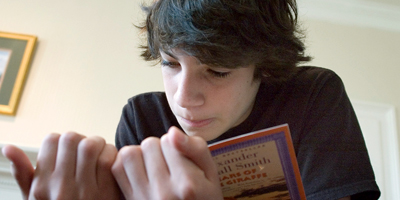
 WASHINGTON—For the past few months, young people have been hearing the message from school and government officials about eating better and exercising. Now, during the summer, they also are being advised to pick up a book — or better yet, five.
WASHINGTON—For the past few months, young people have been hearing the message from school and government officials about eating better and exercising. Now, during the summer, they also are being advised to pick up a book — or better yet, five.
In early June, first lady Michelle Obama announced a campaign called “Let’s Read. Let’s Move” aimed at getting volunteers to tackle childhood obesity and what educators call summer learning loss.
During a June 8 event in Washington to promote this initiative, she said: “We are asking individuals and community organizations, corporations, foundations and government to come together and devote their time and energy to help our kids stay active and healthy — and to keep them learning — all summer long.”
The initiative has the support of U.S. Education Secretary Arne Duncan, who recommends that students read five books over the summer to stay on the learning track and minimize the loss of learning that can occur during vacation months.
Reading lists
Summer reading lists are nothing new to most high schools, and in recent years, they have become commonplace in primary schools, too, with lists for every grade — including kindergarten.
According to the website for Prince of Peace School in Taylors, S.C., research suggests that preparation for opportunities that demand “high stakes outcomes” is rooted in a focus on reading comprehension and reading fluency by third grade.
Required reading lists made their way into high schools in the 1960s — back in the pre-Internet, video-game age, when fewer young people spent their summer months at multiple sessions of specialized camps.
In recent years, these lists have become a little more student-friendly. For example, most schools offer choices for their students instead of just telling them the specific books to read. Many schools have also widened their reading selections beyond the classics to include modern books.
Bishop England High School on Daniel Island, S.C., has done just that. In addition to some classics the whole school is reading “Tears of the Giraffe,” Alexander McCall Smith’s follow-up to “The No. 1 Ladies Detective Agency.”
More than book reports
In general, schools don’t seem to want plain old book reports from summer reading either. At Nativity School on James Island, S.C., the English teacher is looking for PowerPoint presentations or story boards from students in sixth to eighth grade.
The librarian at St. Michael Catholic School in Houston posted several tips for student readers on the school website. Tips included: taking notes while reading or listening to the book on tape while following along with the text, if the student is having a hard time reading. If the book was made into a movie, students are encouraged to watch it and compare the two.
Getting students to read and hopefully enjoy it seems to be a major goal of required reading assignments, but whether or not that happens probably varies from student to student.
Mary Leonhardt is a high school reading teacher who has taught at Catholic and public high schools. She has written several books on encouraging school-age readers, including “Keeping Kids Reading: How to Raise Avid Readers in the Video Age.”
She told CNS in a previous interview that she is a little leery about assigned reading lists and is happy for students to be reading just about anything.
More often than not, she said, when students read even easy paperbacks, they develop a love for reading that will spill over into more difficult works of literature, but she rarely sees this trend work in reverse.
Leonhardt said when students tackle books they don’t like, they often get so frustrated that they completely miss the point that reading can be fun and end up giving up on it.
Deirdre C. Mays of The Catholic Miscellany contributed to this story.
